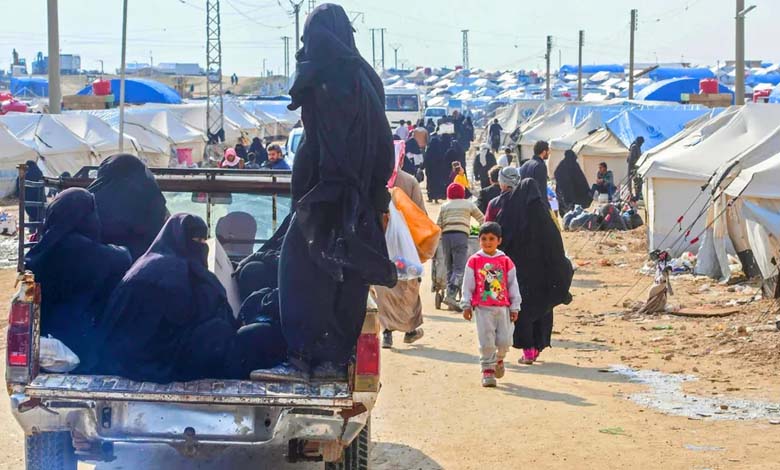The tragedy of Al-Hol camp: Lives caught between the hammer of crises and the anvil of homeland rejection.

In northern Syria, the Al-Hol camp stands as a witness to the complexities of war and its humanitarian repercussions, where thousands of people live in harsh conditions, trapped between the walls of conflict and European rejection policies.
The camp, currently housing over 43,000 individuals, serves as a refuge for many families associated with Islamic State fighters, who now find themselves deprived of the right to return to their European homelands.
In a world seeking to heal its wounds, the issue of the Al-Hol camp emerges as a dark spot on the canvas of humanity, where children and women wander in oblivion, while European countries disregard the calls of the United Nations and human rights organizations to repatriate their citizens, citing security concerns and terrorism threats.
Current Situation
The Al-Hol camp witnesses recurring violent incidents, with the Syrian Democratic Forces (SDF) striving to maintain security, but to no avail amid continued assassinations and attacks, leading to the suspension of humanitarian activities and aid, further exacerbating the suffering of the residents.
The Swedish Foreign Minister announced Wednesday that his country will not repatriate either children or adults from extremist camps and detention centers in northeastern Syria.
Minister Tobias Billström stated in a message to “France Presse”: “The government will not work to ensure the transfer of Swedish citizens and individuals with ties to Sweden who are in camps or detention centers in northeastern Syria to Sweden,” adding that Sweden is not obligated and has no legal duty to repatriate these individuals to Sweden, confirming that this applies to women, children, and men.
Challenges and Fears
European countries face multiple challenges in the Al-Hol issue, ranging from fear of terrorist returnees to legal and logistical challenges.
While the United Nations emphasizes the need to repatriate at least children, European countries remain hesitant, jeopardizing the future of these children.
Professor Ibrahim Ahmed, an international law expert, says that in addition to these challenges, European countries face increasing pressure from the international community and human rights organizations to fulfill their responsibilities towards their citizens.
He added that children in the Al-Hol camp are victims of circumstances beyond their control, and studies indicate that repatriating and rehabilitating them could prevent the recurrence of the cycle of violence and extremism.
The professor of international law continued, stressing the need for urgent and effective solutions to ensure a better future for these children and the security of the region as a whole.
In this context, humanitarian voices call for transcending narrow political calculations and viewing the crisis from a humanitarian perspective focused on the rights and dignity of the child.
International Cooperation
Experts emphasize the importance of adopting a comprehensive approach involving the provision of humanitarian assistance and aid to improve living conditions within the camp, as well as working on legal and security solutions to facilitate the repatriation process.
Dr. Tarek Fahmy, a professor of political science, indicates that reintegration poses a major challenge to regional stability and combating violent extremism, adding that European countries’ refusal to repatriate their citizens, including children and women from families affiliated with the Islamic State, is linked to primary security concerns.
He highlighted the need to analyze the challenges facing returnees from Al-Hol and find solutions, focusing on the mechanisms and challenges associated with return.
The professor of political science continued by stating that the solution lies in strengthening international efforts to permanently address the situation of detainees affiliated with the Islamic State, considering that international cooperation and burden-sharing between European countries and regional partners are crucial to finding sustainable solutions to the crisis.
In this crisis, the question remains: will European countries abandon their citizens indefinitely, or will they find room in their hearts for mercy and responsibility? Time is pressing for all, and urgent solutions are needed for this complex humanitarian and security crisis.












